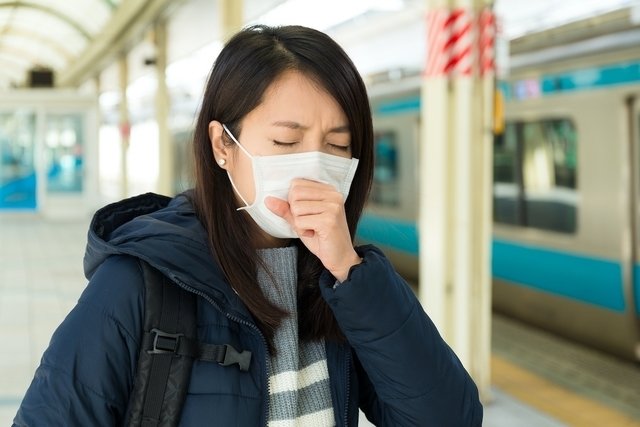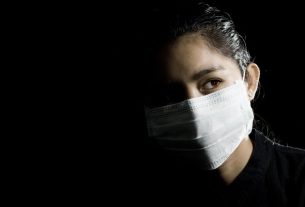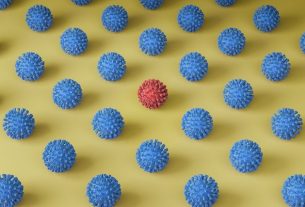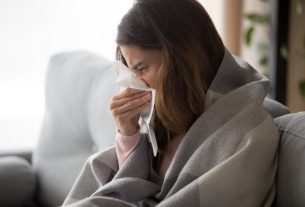COVID-19 is an infection caused by a new type of coronavirus, SARS-CoV-2, and is characterized by the appearance of flu-like symptoms, such as fever, headache and general malaise, in addition to difficulty in breathe.
This infection first emerged in China, but was quickly spread to several countries, giving rise to the COVID-19 pandemic. This rapid spread is mainly due to the easy way the virus is transmitted, which is through inhalation of droplets of saliva and respiratory secretions that contain the virus and which remain suspended in the air, after coughing or sneezing, for example.
It is important that preventive measures are adopted to avoid contagion and transmission, helping to fight the pandemic. Learn more about coronavirus, symptoms and how to identify it.

As it is a new virus, there are several doubts. Below, we have put together the main questions about COVID-19 to try to clarify each one:
1. What to do in case of COVID-19?
If you have symptoms suggestive of COVID-19, have a positive test or have been in contact with an infected person, please enter your details to find out what you should do:
2. Is the virus transmitted through the air?
The virus that causes COVID-19 is transmitted mainly through inhalation of droplets of saliva or respiratory secretions that become present in the air when an infected person coughs, sneezes or speaks, for example, or through contact with contaminated surfaces.
Therefore, to prevent transmission, it is recommended that people who have been confirmed with the new coronavirus, or who present symptoms that are indicative of the infection, wear protective masks to avoid passing the virus to other people. See more about COVID-19 transmission.
3. Can someone without symptoms transmit the virus?
Yes, mainly due to the incubation period of the disease, that is, the period between infection and the appearance of the first symptoms, which in the case of COVID-19 can vary between 1 and 14 days. Thus, a person can have the virus and not know it, and transmission to other people is theoretically possible. However, most contamination seems to only happen when a person starts coughing or sneezing.
Therefore, if you do not have symptoms, but are included in a risk group or have had contact with people who have been confirmed to have the infection, it is recommended that quarantine be carried out, because in this way it is possible to check whether the infection has occurred. development of symptoms and, if positive, prevent the spread of the virus. Understand what quarantine is and how quarantine should be carried out.
4. When to get the vaccine?
The COVID-19 vaccine is recommended for everyone over 5 years of age, and it is important to follow the guidelines of the Ministry of Health and the local Health Department regarding the vaccination plan. In general, vaccines from Pfizer, AstraZeneca, Coronavac and Janssen are recommended.
For children, the application of Pfizer is authorized for children between 5 and 11 years old, in a lower dose than that administered to adults and with a different concentration of components, and Coronavac for children over 3 years old. In the case of people over 18 years of age, any of the vaccines can be administered, and it is important to follow the guidelines regarding the interval between doses:
- Coronavac: the second dose is indicated after 28 days;
- Pfizer: the second dose is indicated after 8 weeks;
- AstraZeneca: the second dose is indicated after 8 weeks;
- Janssen: initially it was a single dose, but the second dose is being recommended after 2 months.
Furthermore, it is also recommended to take the third dose of the COVID-19 vaccine approximately 4 months after completing the vaccination schedule, as this makes it possible to reinforce immunity against the new coronavirus and thus reduce the risk of serious infection. Find out when to take the third dose by filling out the calculator below:
5. Is nebulization indicated to relieve symptoms?
The use of nebulizers is usually only indicated when other support measures do not have the desired effect, as the use of nebulizers increases the generation and release into the environment of droplets that can remain suspended in the air and infect other people. Therefore, if recommended by a doctor, it is recommended that people who frequent the same environment use PFF2/N95 masks and frequently disinfect their hands and surfaces in order to prevent infection.
It is best to use mechanisms that do not lead to the formation of droplets, such as pressurized or dry powder devices, with or without a spacer, or mist devices.
Before starting nebulization, it is essential that the doctor is consulted so that an assessment can be made of the patient’s general condition and the best method for relieving symptoms can be advised.
6. What are COVID-19 variants?
COVID-19 variants arise as a consequence of changes during virus replication, which can give rise to mutations that can be advantageous for the virus, that is, that can make the virus more resistant to the action of the immune system and/or increase its infectious and transmission capacity. The variant identified and classified by the WHO as a variant of concern is Ômicron, as well as its subvariants.
7. Does antibiotic treat coronavirus?
Antibiotics are only active against bacteria and some fungi and parasites, having no effect on viruses. Furthermore, when antibiotics are used without medical advice, microbial resistance to antibiotics may be encouraged, in addition to a decrease in the activity of the immune system, favoring the occurrence of other diseases.
Treatment for COVID-19 involves supportive measures, such as hydration, rest and adequate nutrition, and must be done in isolation to prevent the spread and transmission of the virus to other people. Furthermore, in mild and moderate cases that do not require oxygen supplementation, Anvisa authorized the use of a cocktail of antibodies, which must be administered in the hospital, and which help to speed up recovery and prevent the infection from worsening. See more details on treatment for COVID-19.
8. Is it safe to travel?
It is important to consult the guidelines of the travel destination, because some countries have adopted measures to prevent the transmission of the virus, and there may be mandatory isolation as soon as you arrive at the location, as well as carrying out the RT-PCR or antigen test for COVID-19. before boarding.
Means of transporting people normally do not have much air circulation and transport a large number of people, which could also favor transmission. Therefore, if travel is necessary and authorized by health authorities, it is important to adopt precautionary measures, such as covering your mouth and nose with a mask, avoiding touching your eyes or mouth with your hands and washing your hands with water. and soap often.
9. Does vitamin C help protect against COVID-19?
There is no scientific evidence to indicate that vitamin C helps fight the new coronavirus. What is known is that this vitamin helps to improve the immune system, as it is rich in antioxidants that fight free radicals, preventing the occurrence of infectious diseases and can alleviate cold symptoms.
To protect yourself against the coronavirus, in addition to having a diet that improves the activity of the immune system, giving preference to foods rich in omega-3, selenium, zinc, vitamins and probiotics, such as fish, chestnuts, oranges, sunflower seeds, yogurt , tomatoes, watermelon and unpeeled potatoes, for example. Although garlic has antimicrobial properties, it has not yet been verified whether it has an effect on the new coronavirus and, therefore, it is important to invest in a balanced diet. See what to eat to improve your immune system.
It is also important to wash your hands well with soap and water for at least 20 seconds, avoid closed environments with lots of people and cover your mouth and nose whenever you need to cough or sneeze. This way, it is possible to avoid contagion and transmission of the virus to other people. Check out other ways to protect yourself against coronavirus.
10. Does Ibuprofen worsen COVID-19 symptoms?
A study carried out by researchers from Switzerland and Greece in March 2020 indicated that the use of Ibuprofen was capable of increasing the expression of an enzyme found in lung, kidney and heart cells, which would make respiratory symptoms more severe. However, this relationship was made based on just one study carried out on diabetics and taking into account the expression of the same enzyme, but present in cardiac tissue.
Therefore, it is not possible to say that the use of Ibuprofen is related to the worsening of the signs and symptoms of COVID-19. See more about the possible relationship between coronavirus and the use of Ibuprofen.
11. How long does it take to get the test results?
The time between collecting the sample and releasing the result may vary according to the type of exam that will be carried out, ranging from 15 minutes to 7 days. The results that come out in the shortest time are those that are carried out through rapid tests.
The difference between these two is the sample collected: while immunofluorescence uses a sample from the respiratory tract, which is collected through a nasal swab, immunochromatography is done from a small sample of blood. In both tests, the sample comes into contact with the reagent and, if the person has the virus, it takes between 15 and 30 minutes, and the case of COVID-19 is confirmed. Learn more about COVID-19 testing.
The test that takes the longest to be released is the PCR, which is a more specific molecular test, considered the gold standard and is carried out mainly to confirm the positive case. This test is carried out using a blood sample or sample collected by nasal or oral swab, and indicates whether there is infection with SARS-CoV-2 and the number of virus copies in the body, indicating the severity of the disease. Find out how to understand the RT-PCR result for COVID-19.
12. How long does the virus survive?
Research carried out in March 2020 by American scientists indicated that the survival time of SARS-CoV-2, responsible for COVID-19, varies according to the type of surface it is found on and environmental conditions. Thus, in general, the virus can survive and remain infectious for approximately:
- 3 days, in the case of plastic and stainless steel surfaces;
- 4 hours, in the case of copper surfaces;
- 24 hours, in the case of cardboard surfaces;
- 3 hours in the form of aerosols, which can be released when an infected person nebulizes, for example.
Although it can be present on surfaces in its infectious form for a few hours, this type of contagion has not yet been determined. However, it is recommended that surfaces that may contain the virus be disinfected, in addition to being important to use alcohol gel and wash your hands with soap and water regularly.

Sign up for our newsletter and stay up to date with exclusive news
that can transform your routine!
Warning: Undefined array key "title" in /home/storelat/public_html/wp-content/plugins/link-whisper-premium/templates/frontend/related-posts.php on line 12
Warning: Undefined array key "title_tag" in /home/storelat/public_html/wp-content/plugins/link-whisper-premium/templates/frontend/related-posts.php on line 13



